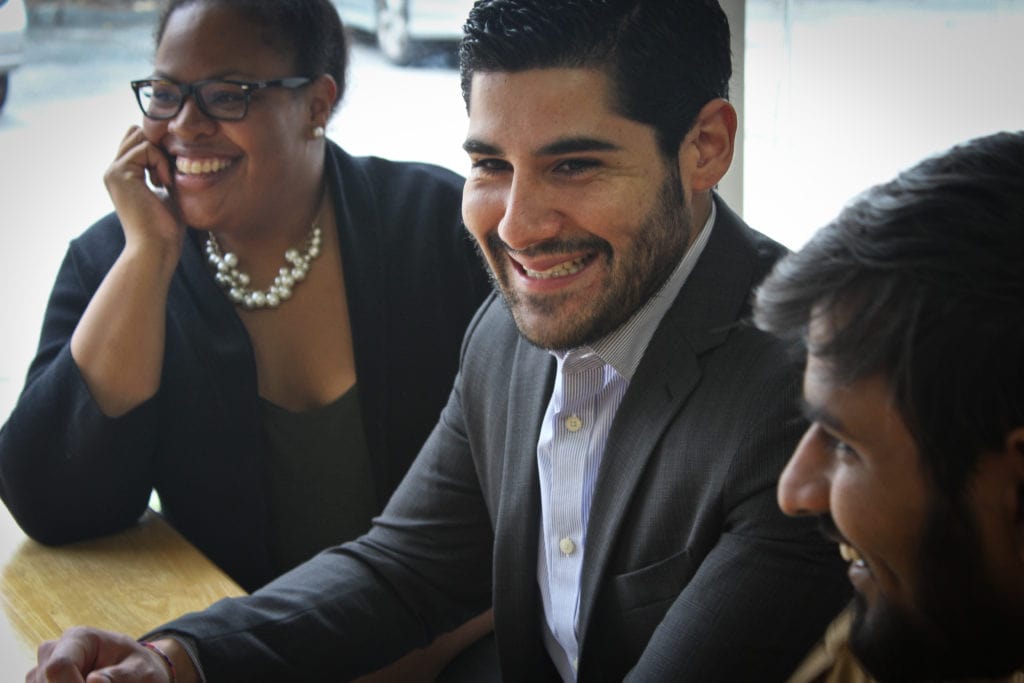The Doctor of Psychology (PsyD) in Clinical Psychology degree program provides formal training in the science and practice of clinical psychology. In addition to broad and rigorous preparation in clinical psychology, the program provides training in theory and treatment inspired by positive psychology and both secular and spiritual concepts and interventions. Mindfulness as a source of both clinician self-care and treatment interventions is a core component of the curriculum.
After degree completion, graduates are prepared for a career as a licensed clinical psychologist, which may include work in substance abuse and mental health treatment settings, corrections agencies, private practice, supervisory and program development positions in healthcare settings, teaching, and/or research.
Advisors meet with each student quarterly for ongoing mentoring, advising, and review of students’ progress. Annually, advisors meet with each student for a formal review of student progress. When necessary, students will meet with appropriate faculty members, advisors, and the Program Chair for further discussion and recommendation.
Students may elect to receive the Master of Arts in Psychology (MA) degree while enrolled in the PsyD program after successful completion of a sub-set of the total PsyD requirements. Students may not apply for the MA or enter Sofia University with the intention of completing the MA alone. However, during the course of their studies, they may petition for receipt of the master’s degree.
State Authorizations for Distance Education
Sofia University is licensed, registered, authorized, certified, or formally exempt in the following states and territories as indicated on our State Authorizations page.
Professional Licensure
Please visit our Professional Licensure page for more information.
Course Information:
At-a-glance information about this course for your convenience:
Next Start Date: | Admission for the 2020-2021 cohort is currently closed. Please contact (888) 820-1484 or email admissions@sofia.edu for additional questions. |
|---|---|
Program Length: | 3 Years |
Total Number of Units: | 75 (Minimum) |
Estimated Total Cost: | $60,000 |
Estimated Fees: | $350 |
Format: | Residential |
Key Program Highlights:
Explore what’s unique about our PsyD program.
1. Reflection
Reflects a distinctive, in some ways irreducible, human motivation–the yearning for the sacred that contributes in unique ways to health and well-being. Spirituality is increasingly being studied in psychology as a virtue in positive psychology, and as a mechanism of change in mindfulness and acceptance-based psychotherapies.
The spiritual orientation of the Sofia PsyD program is predicated on research demonstrating that the presence of spiritual and/or religious practices in a person’ life has significant and long-lasting benefits for psychological and physical health and that sensitive and evidence-based incorporation of the client’s spiritual beliefs and practices builds the therapeutic alliance.
The spiritual orientation to clinical psychology that underlies the program is nondenominational. Spiritual and culturally-based religious beliefs and practices as well as an understanding of major world religions are integral to training to be a proficient clinical psychologist in research, assessment, and therapy.
2. Practice
Practices enhance a training therapist’s ability to attend to and empathize with the client. They also cultivate qualities including compassion and unconditional positive regard that are among the common factors shown to strengthen the therapeutic relationship and improve outcome. Studies have demonstrated that therapists value mindfulness training and see it as helpful to their role as a clinician.
Mindfulness practices taught at Sofia University include qigong, aikido, and vipassana meditation. It may seem paradoxical to include aikido, a martial art, as a way to train psychology students in mindfulness and relationship building skills. However, aikido is a form of moving meditation that requires the mind to be focused in the here-and-now, and in harmony with the movement of the body. Also, aikido emphasizes the importance of connecting, collaborating, and blending with a partner that provides an experiential understanding of core psychotherapeutic relational factors that impact effectiveness such as unconditional positive regard (there is no competition in aikido practice, only collaboration), therapeutic presence, staying centered when challenged by clients and blending empathically with clients.
6. Scientific Understanding
The branch of psychology uses scientific understanding and evidence-based interventions to enhance well-being rather than focusing on treating psychological symptoms and problems. While having its roots in humanistic and transpersonal psychology, which focused heavily on happiness and fulfillment, positive psychology emphasizes the use of the scientific method to develop and assess interventions that further human functioning and flourishing. Forgiveness, compassion, and gratitude are some of the topics covered in the Sofia PsyD curriculum.
Learning Outcomes:
Here’s what you can expect to walk away from this program with…
1. Analyze
Analyze and explain human behavior using current theory, methods, and research in the affective, social, individual differences, and cognitive areas of psychology, and formulate appropriate interventions to serve the needs of diverse clients.
2. Summarize
Summarize, assess, and apply the integration of positive psychology and spiritual diversity in clinical psychology theory, research, and practice.
3. Create
Create ethical and legal interventions to human psychology problems by integrating sound reflective judgment, appropriate moral and ethical frameworks, and clinical psychology knowledge.
4. Explain
Summarize and explain the importance of and sensitivity to individual and cultural diversity in their academic, clinical, and professional work and relationships.
5. Communicate
Communicate effectively, ethically, and sensitively using a variety of media and genres to meet the needs and intended audience in a variety of personal and professional settings.
6. Reflect
Reflect upon their own whole-person development relative to the field of psychology and identify opportunities for continuing professional development.
Career Paths:
The Doctor of Psychology (PsyD) in Clinical Psychology degree opens up a multitude of career opportunities where graduates can apply their extensive knowledge and experience in clinical psychology.
Licensed Clinical Psychologist
As a licensed clinical psychologist, you can conduct psychological assessments and provide treatment for a wide range of mental health issues. Your work can span various settings, including hospitals, private practices, or mental health clinics. This role requires a comprehensive understanding of human behavior, psychological disorders, and treatment interventions.
Substance Abuse Counselor
With your in-depth understanding of psychological theories and methods, you can help individuals suffering from substance abuse problems. You will be equipped to design and implement treatment plans, help clients understand and manage their addiction, and provide continued support for those in recovery.
Researcher
Graduates can also pursue careers in academic or private research, utilizing the strong research skills gained during the PsyD program. As a researcher, you could explore various areas within clinical psychology, including positive psychology, spiritual concepts, or mindfulness-based interventions.
Educator
The PsyD program provides graduates with extensive knowledge in clinical psychology, making them well-equipped to educate the next generation of psychologists. As a faculty member in a university or college, you can teach courses, supervise student research, and contribute to curriculum development.
Clinical Supervisor or Program Developer
With the leadership skills gained during the program, graduates can take on roles as clinical supervisors or program developers in healthcare settings. This may involve overseeing clinical staff, developing and implementing new mental health programs, and ensuring the effectiveness and quality of existing services.
Curriculum:
To receive a Doctor of Psychology in Clinical Psychology degree, students must successfully complete a minimum of 120 units. The following are specific degree requirements:
Core Courses are distributed across four years and are required as follows (listed in order by course number and not necessarily the sequence in which courses are taken):
- PSY10610 Creative Expression in Clinical Practice I (1)
- PSY10620 Creative Expression in Clinical Practice II (1)
- PSY20100 Human
- Sexuality (2)
- PSY20150 Diversity Issues in Clinical Practice (3)
- PSY20210 Psychopathology and Diagnosis (3)
- PSY20230 Treatment of Chemical Dependency and Dual Diagnosis (2)
- PSY20300 Aging and Long-Term Care (0)
- PSY2049A Clinical Practicum Seminar A (3)
- PSY2049B Clinical Practicum Seminar B (3)
- PSY2049C Clinical Practicum Seminar C (3)
- PSY2050 Psychometric Theory Applications and Reports I (3)
- PSY2051 Psychometric Theory Applications and Reports II (3)
- PSY2052 Psychometric Theory Applications and Reports III (3)
- PSY20530 Laws and Ethics I (3)
- PSY20710 Child Abuse Assessment and Reporting (0)
- PSY20720 Spouse/Partner Abuse Assessment and Treatment (0)
- PSY2079A Advanced Clinical Practicum Seminar A (3)
- PSY2079B Advanced Clinical Practicum Seminar B (3)
- PSY2079C Advanced Clinical Practicum Seminar C (3)
- PSY2080 Biological Basis of Behavior Part A (3)
- PSY2081 Biological Basis of Behavior Part B (2)
- PSY2104 Supervision Consultation and Leadership in Clinical Psychology (3)
- PSY21110 Mindfulness-Based Interventions I (2)
- PSY21120 Mindfulness-Based Interventions II (2)
- PSY21130 Mindfulness-Based Interventions III (2)
- PSY2223 Personal and Clinical Applications of Positive Psychology (3)
- PSY2900 Introduction to Group Therapy (2)
- PSY29400 Psychotherapy Theory and Interventions – Humanistic and Existential (3)
- PSY2941 Psychotherapy Theory and Interventions – Cognitive Behavioral Therapy (3)
- PSY29420 Psychotherapy Theory and Interventions – Couples and Family Systems (3)
- PSY39200 Clinical Psychology Theory and Research – Spiritual Applications (3)
- PSY4080 Research Seminar A: Dissertation Hypotheses, Methods, and Design (1)
- PSY4081 Research Seminar B: Dissertation Proposal (3)
- PSY48010 Creative Expression in Clinical Practice III (1)
- PSY60010 Human Development A (3)
- PSY60020 Human Development B (2)
- PSY6007 History and Systems (3)
- PSY60210 Scientific Scholarly Writing (2)
- PSY6030 Social Bases of Behavior (3)
- PSY60360 Qualitative Research Methods (3)
- PSY60370 Quantitative Research Methods (3)
- PSY60380 Advanced Research Methods (3)
- PSY6041 Cognitive and Affective Bases of Behavior A (2)
- PSY6042 Cognitive and Affective Bases of Behavior B (3)
- PSY8556 Informational Systems in Psychology (3)
- PSYX907 Religious and Spiritual Diversity in Clinical Practice (3)
As part of the Core Courses, students obtain clinical training through a Practicum during Year 2 and an Advanced Practicum during Year 3 of the PsyD program. They are placed in training sites to see clients and receive clinical supervision. The practicum classes (PSY2049A, PSY2049B, PSY2049C) and advanced practicum classes (PSY2079A, PSY2079B, PSY2079C) provide education and supervision to complement the clinical placement.
PsyD students must complete a minimum of 9 units to support their dissertation research:
- PSY6047A Dissertation A (3)
- PSY6047B Dissertation B (3)
- PSY6047C Dissertation C (3)
Should the dissertation not be completed and approved at the end of the PSY6047 sequence, students may continue to research and write the dissertation by completing the following optional courses:
- PSY6048A Dissertation (3)
- PSY6048B Dissertation (3)
- PSY6048C Dissertation (3)
To ensure that students are able to be empathic to their clients and are prepared to be of service to the public, the program requires personal and professional development outside the classroom. This takes the form of 40 hours of personal psychotherapy during Years 1 and 2 that must be completed by the end of the second year of the program. The recommended structure to completing the 40 hours is 20 hours in Year 1 and 20 hours in Year 2 so that students have support in the initial phases of their clinical development. The form to document these hours can be obtained from the Director of Clinical Training and should be turned in before the end of Year 2.
The Clinical Competency Exam (CCE) serves a number of functions:
- Provides students with the opportunity to integrate Years 1, 2, and 3 of doctoral course material with practical training and thus demonstrate their ability to function as a practitioner-scholar.
- Requires students to integrate clinical and research data using theories and methods acquired in the classroom and at practicum to demonstrate knowledge of case formulation, assessment, and treatment.
- Gives students the opportunity to demonstrate that their professional judgment processes are flexible, ethical, and sensitive to client needs.
- Enables faculty to evaluate students’ progress toward expected learning outcomes.
- Allows faculty to evaluate students’ readiness for Internship and their ability to proceed in the program. Students must demonstrate these skills through a written case report and an oral examination, which includes a case presentation and a clinical vignette.
Students are expected to complete their dissertation proposal by the end of the third year. Students are expected to prepare their proposal through the Year 1 and Year 2 research class series. Students develop their dissertation proposal as part of the following Core Courses:
- PSY4080 Research Seminar A: Dissertation Hypotheses, Methods, and Design
- PSY4081 Research Seminar B: Dissertation Proposal
Advancement to Candidacy is a process in which students meet certain requirements that are an indication of their level of skill in academic writing, critical thinking, and independent conduct of doctoral-level research. To complete the Advancement to Candidacy process, students must do the following:
- Have an approved and signed-off dissertation proposal
- Successfully complete all Year 1, Year 2, and Year 3 courses
It is expected that candidacy will occur by the end of the third year. A failure to complete any step of the Advancement to Candidacy process may result in the student being put on probation or asked to exit the doctoral program. Students are expected to make continuous academic progress throughout their enrollment at the University, including their work while completing the dissertation.
Frequently Asked Questions (FAQs):
Navigating the path to a PhD in Clinical Psychology can raise a few questions. Here, we’ve compiled some of the most common inquiries related to the PsyD program at Sofia University.
Yes, students enrolled in the PsyD program may elect to receive the Master of Arts in Psychology degree after successful completion of a subset of the total PsyD requirements. It’s important to note that students cannot apply specifically for the MA or enter Sofia University with the intention of only completing the MA.
Upon degree completion, you can pursue a variety of career paths. Some options include working as a licensed clinical psychologist, substance abuse counselor, researcher, educator, or a clinical supervisor and program developer in healthcare settings.
Mindfulness is a core component of the PsyD curriculum at Sofia University. Some of the mindfulness practices taught include qigong, aikido, and vipassana meditation. These practices enhance a therapist’s ability to attend to and empathize with their clients.
Sofia University is licensed, registered, authorized, certified, or formally exempt in several states and territories. For specific details about state authorizations, you should refer to the State Authorizations page on the university’s website.
The total cost of the program is $60,000.








